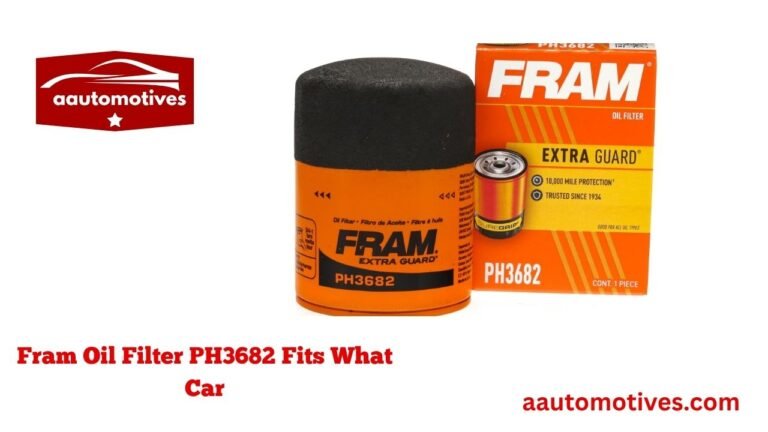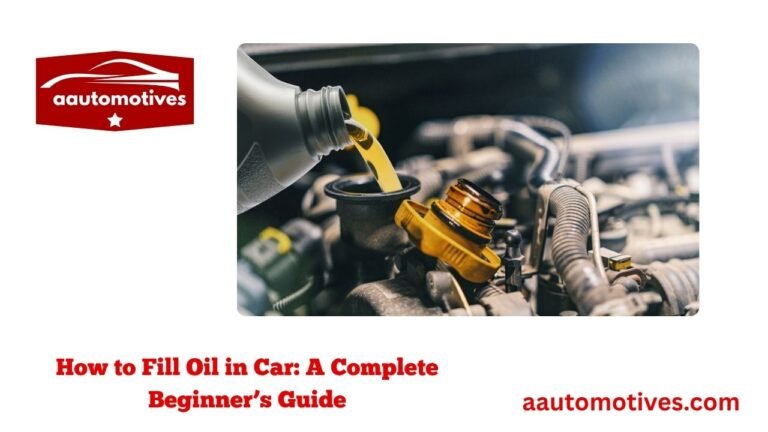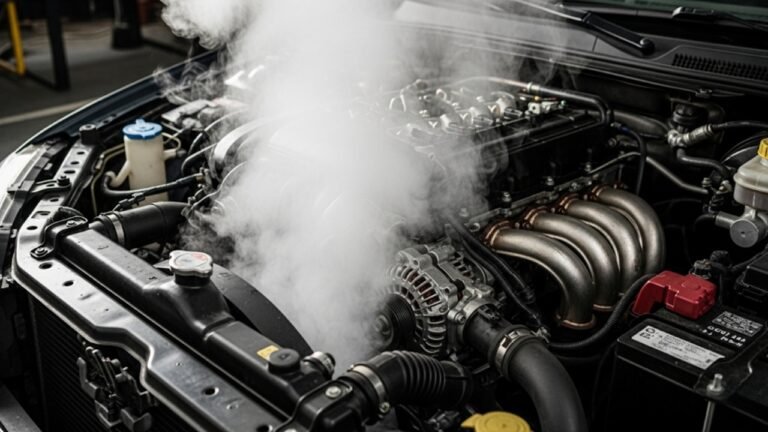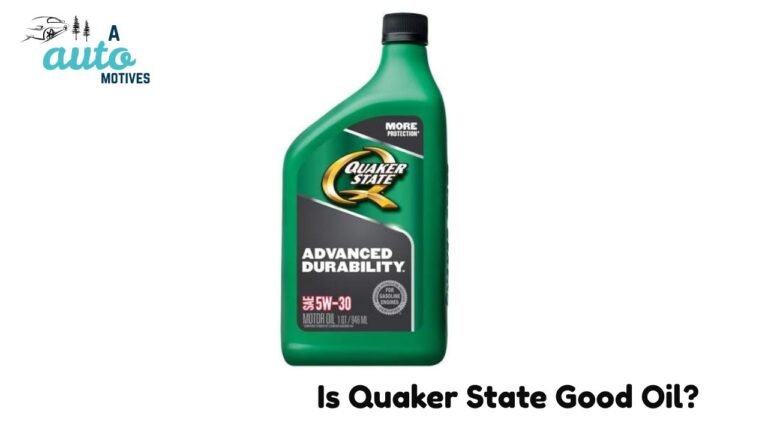What Can Cause a Car to Leak Oil?
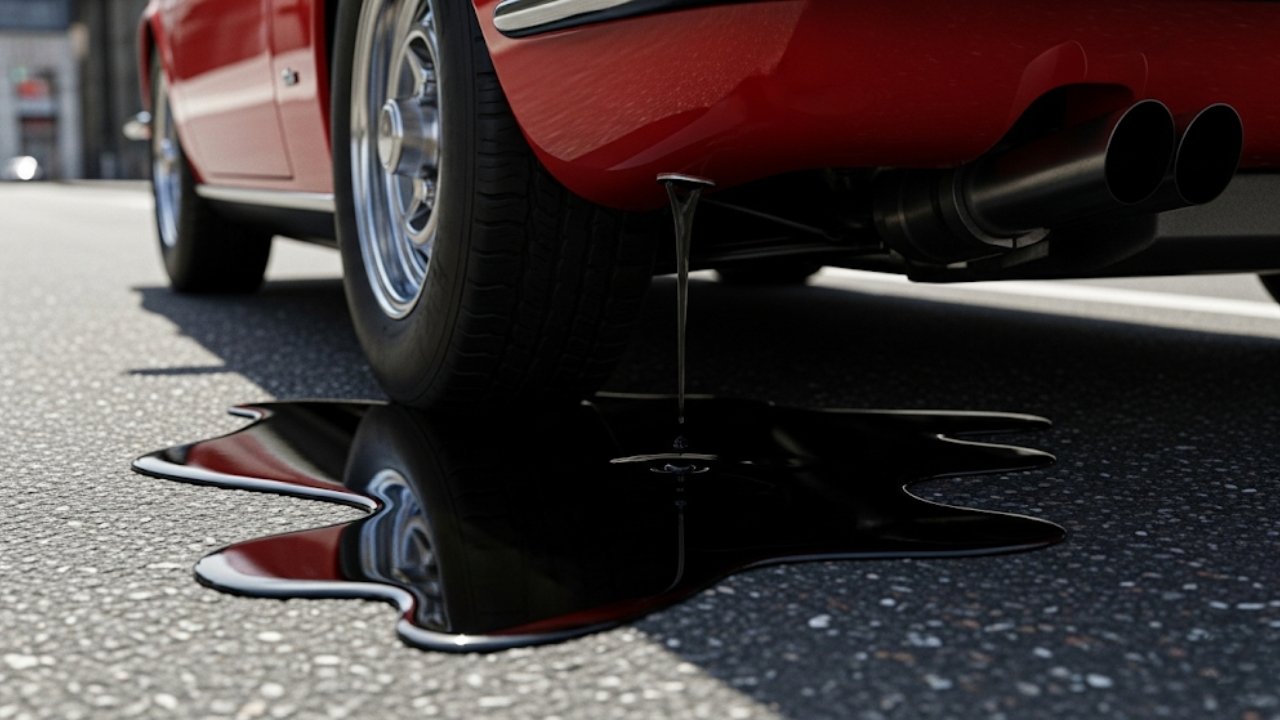
Have you ever walked up to your car in the morning and seen a mysterious dark stain under it? Maybe at first, you brushed it off. “It’s nothing,” you told yourself. But that little oil puddle is trying to tell you something important.
When I saw my first oil leak, I didn’t panic. I just assumed it was something minor. But weeks later, my engine was running rough, and a repair bill hit me like a thunderclap. That small drip was a big warning.
So, what can cause a car to leak oil?
This is a question every car owner should ask before they end up stranded on the side of the road or face an expensive repair.
Let’s unpack it together — simply, honestly, and from one driver to another.
In This Article
- 1 Common Symptoms That Point to an Oil Leak
- 2 Worn Out or Damaged Oil Pan Gasket
- 3 Valve Cover Gasket Failure
- 4 Loose or Damaged Oil Filter
- 5 Damaged or Cracked Oil Pan
- 6 Failing Oil Pressure Sensor
- 7 Common Causes of Oil Leaks and How to Spot Them
- 8 Faulty Oil Drain Plug
- 9 Rear Main Seal Failure
- 10 PCV System Malfunction (Positive Crankcase Ventilation)
- 11 Blown Head Gasket
- 12 Oil Cooler and Lines Leaking
- 13 Why You Should Never Ignore Oil Leaks
- 14 Estimated Repair Costs by Oil Leak Source
- 15 DIY vs Mechanic: When Should You Try Fixing an Oil Leak Yourself?
- 16 Environmental Impact: Where Does That Oil Go?
- 17 Final Tips to Prevent Oil Leaks Before They Happen
- 18 FAQs: What Can Cause a Car to Leak Oil?
- 18.1 1. Can synthetic oil cause leaks?
- 18.2 2. Is a small oil leak dangerous?
- 18.3 3. Can overfilling oil cause leaks?
- 18.4 4. Do oil leaks affect car performance?
- 18.5 5. Can I drive with a leaking rear main seal?
- 18.6 6. How do I find where the oil is leaking from?
- 18.7 7. Why does oil leak after an oil change?
- 18.8 8. Are oil leaks covered by insurance?
- 19 Conclusion: Fix the Drip Before It Becomes a Downpour
Common Symptoms That Point to an Oil Leak

-
Dark puddles under the car after parking
-
Burning oil smell while driving or after stopping
-
Smoke from the engine bay
-
Low oil levels even after a recent oil change
-
Oil warning light flashing on your dashboard
Ignoring these signs can be like ignoring chest pain — you just don’t. A few drops of leaking oil today can become engine failure tomorrow.
Worn Out or Damaged Oil Pan Gasket
The oil pan gasket is like a rubber lid between your oil pan and engine. It keeps the oil sealed tightly.
But over time, heat, pressure, and age wear it out. It can crack or shrink. And when it does? Oil starts seeping out, slowly at first, then faster.
Think of it like a worn-out Tupperware seal — it may look closed, but it leaks when you move it.
Why does this happen?
-
High engine heat over time
-
Improper installation during oil changes
-
Hitting a speed bump too hard
Fixing it: Replacing the oil pan gasket isn’t too expensive. But delay it, and oil can splash onto other parts, making everything messier and riskier.
Pro Tip: If you park overnight and find fresh oil near the middle-bottom of your car, this might be the culprit.
Valve Cover Gasket Failure
Now, here’s something that surprised me during my early driving years. The valve cover gasket — a tiny part at the top of your engine — can cause big leaks if it fails.
Its job is to keep oil inside while your valves and camshafts dance during combustion. But heat, time, and vibration can make it crack.
Signs of a bad valve cover gasket:
-
Oil on top of your engine
-
Burning smell from oil dripping onto hot engine parts
-
A rough-running engine due to oil seeping into spark plugs
Why it matters:
If oil leaks into your spark plug wells, your engine misfires. It won’t just affect performance — it’ll hurt your fuel economy too.
So when people ask, “what can cause a car to leak oil?”, this tiny but vital gasket is high on the list.
Loose or Damaged Oil Filter
One of the simplest — yet most overlooked — causes is the oil filter. After an oil change, if the filter isn’t properly tightened or is damaged, it can leak.
It happened to me once. A quick lube shop didn’t install it right. The next day, I noticed oil dripping like coffee from a broken pot.
Reasons for oil filter leaks:
-
Cross-threading during installation
-
Old, brittle rubber seals
-
Replacing the filter but leaving behind the old gasket (a double gasket situation)
Solution: Always double-check the oil filter after an oil change. Better yet, ask the mechanic to show it to you.
Damaged or Cracked Oil Pan
This one’s more physical. If you’ve ever bottomed out on a speed bump or hit road debris, your oil pan might be cracked or dented.
The oil pan is located under your engine and holds most of your car’s oil. When damaged, it can leak even when your car is off.
Symptoms of a cracked oil pan:
-
A noticeable puddle (not just a spot) under your car
-
A sudden drop in oil levels
-
Visible dents or scrapes under the vehicle
I remember once driving through a poorly lit village road after heavy rain. I hit something hard under the car — and boom — oil started leaking right there. A crack in the pan meant a tow truck and an unexpected hotel stay.
Repair or replace?
Small cracks can be sealed with epoxy. But big dents or holes mean full replacement.
Failing Oil Pressure Sensor
This one is a little more technical but still common. Your oil pressure sensor tells your car’s computer how much oil pressure there is. Sometimes, the sensor itself fails or leaks.
Why this happens:
-
Age and wear
-
Heat exposure
-
Vibration over time
If oil is leaking from the sensor, you might not see a puddle — but your dashboard will often flash a warning.
Why it’s dangerous:
If the sensor leaks or reads wrong, your engine might think everything’s fine when it’s not. That could lead to catastrophic damage.
In short, always trust your gut. If you suspect a leak, don’t just clear the light. Check the sensor or get a mechanic to test it.
Common Causes of Oil Leaks and How to Spot Them
| Cause | Where It Leaks | Signs to Watch For | Typical Fix |
|---|---|---|---|
| Oil Pan Gasket | Bottom of engine | Puddle under car, oil loss | Gasket replacement |
| Valve Cover Gasket | Top of engine | Oil smell, engine misfire | Gasket replacement |
| Oil Filter | Around filter area | Fresh oil leaks post oil change | Reinstall or replace filter |
| Cracked Oil Pan | Under the engine | Large leak, quick oil loss | Patch or replace oil pan |
| Oil Pressure Sensor | Near engine block | Warning light, minor drip | Replace sensor |
Faulty Oil Drain Plug
After every oil change, the drain plug at the bottom of the oil pan must be re-tightened. If it’s too loose, stripped, or the washer is worn out, it becomes a leak point.
I had this issue once when doing a DIY oil change at home. I overtightened the plug, stripped the threads, and ended up with a slow but steady leak for weeks.
Warning signs:
-
Oil dripping from the plug area
-
A wet patch right under the bolt
-
Oil loss despite a clean engine
Fix:
If threads are stripped, you may need a new oil pan or a thread repair kit. Always use a proper torque wrench and don’t overdo it.
Rear Main Seal Failure
Now, this one is the big bad wolf of oil leaks. The rear main seal is between your engine and transmission. If it leaks, you may not even see oil — it drips deep within the engine bay.
Why this is serious:
-
Hard to spot
-
Expensive to fix
-
Often ignored until major damage is done
You might just see oil loss and wonder why. Or maybe there’s a stain near the back of the engine, right in the middle. That’s your clue.
Personal experience:
My uncle ignored his leak for months. One day, the engine seized up while driving. The repair? A full engine teardown. Cost him more than the car’s worth.
PCV System Malfunction (Positive Crankcase Ventilation)
This one hides in plain sight. The PCV valve helps your engine breathe. It lets gases escape from the crankcase and directs them back into the combustion process.
When this system fails, pressure builds up inside the engine. That pressure pushes oil past gaskets and seals, even if they’re in good shape.
Why this happens:
-
PCV valve clogs with carbon
-
Hoses crack from heat
-
Blockages cause pressure spikes
Symptoms of a PCV failure:
-
Oily residue around the valve cover or dipstick
-
Sludge in your oil
-
Increased oil consumption
-
Engine running rough
It’s one of those sneaky things that cause oil leaks without you realizing it. I once ignored mine, thinking the leak was minor. But after a smoke test at the mechanic, the PCV valve turned out to be the silent troublemaker.
Blown Head Gasket
Here’s one that every car owner dreads. The head gasket separates the engine block from the cylinder head. When it fails, it can let oil and coolant mix — or leak externally.
Why it’s scary:
-
It affects your cooling system
-
It causes loss of compression
-
Repair is labor-intensive and costly
Clues your head gasket may be leaking oil:
-
Milky residue on oil cap (oil + coolant mix)
-
White exhaust smoke
-
Engine overheating
-
Oil leaking from engine block seam
I had a friend who noticed oil seeping from the side of the engine and assumed it was a gasket. By the time he got it checked, the head gasket was blown, and the repair cost more than his monthly salary.
Don’t delay diagnosis on this one.
Oil Cooler and Lines Leaking
Some vehicles — especially performance or turbocharged ones — have oil coolers. They regulate oil temperature by passing it through a separate cooling unit.
But the cooler lines can crack, or their connectors may corrode and leak.
Look out for:
-
Oil near the front of the engine bay
-
Drop in oil pressure
-
Oil sprayed on the radiator or grille area
Why it matters:
Cool oil protects your engine. If it leaks, you not only lose oil, but the remaining oil also gets hotter — which breaks it down faster.
Fix: Replace worn-out hoses, tighten clamps, and flush the oil if needed.
Why You Should Never Ignore Oil Leaks
Let’s talk real life. Not technical stuff — just honesty.
I get it. You’re busy. You notice a leak and think, “It’s just a few drops.”
But those few drops add up. Here’s what oil leaks can really lead to:
-
Engine wear: Oil lubricates moving parts. Without it, metal grinds metal.
-
Fire hazard: Oil on hot surfaces can ignite.
-
Environmental harm: Oil leaks pollute soil and water.
-
Loss of resale value: Buyers spot oil leaks during inspections.
-
Costly repairs: What starts as a $20 gasket can become a $2,000 engine rebuild.
Ignoring an oil leak is like ignoring a roof leak. Small today, destructive tomorrow.
Estimated Repair Costs by Oil Leak Source
| Leak Source | Estimated Repair Cost (USD) | Repair Complexity |
|---|---|---|
| Oil Pan Gasket | $150 – $400 | Moderate |
| Valve Cover Gasket | $100 – $300 | Easy |
| Oil Filter or Drain Plug | $20 – $100 | Easy |
| Oil Pan Replacement | $300 – $700 | Moderate |
| Rear Main Seal | $600 – $1,500+ | High |
| PCV Valve | $50 – $150 | Easy |
| Head Gasket | $1,000 – $2,500 | Very High |
| Oil Cooler Lines | $100 – $350 | Moderate |
DIY vs Mechanic: When Should You Try Fixing an Oil Leak Yourself?
If you’re handy and have some tools, you can handle:
-
Oil filter and drain plug replacement
-
Valve cover gasket replacement
-
PCV valve replacement
But if it involves removing the transmission, engine block, or radiator, take it to a trusted mechanic.
Golden rule:
If you can’t access the leaking part easily or don’t know where the leak starts, don’t guess. Leaks can drip from one area but originate from another.
My advice? Spend $100 on a mechanic’s diagnosis before wasting $300 on parts you may not need.
Environmental Impact: Where Does That Oil Go?
Every time oil leaks, it’s not just your engine that suffers — Mother Earth does too.
-
One quart of oil can contaminate 250,000 gallons of water
-
Oil on streets washes into drains, ending up in rivers
-
Wildlife exposed to oil suffers toxicity and death
Tip: Use oil-absorbing pads under your car if you can’t fix the leak right away. Dispose of used oil responsibly.
We owe it to our planet to act responsibly. Fixing an oil leak isn’t just about your car — it’s about everything your car touches.
Final Tips to Prevent Oil Leaks Before They Happen
-
Change oil regularly and check levels monthly
-
Use high-quality oil and filters that match your engine specs
-
Tighten bolts properly—not too loose, not too tight
-
Check seals and gaskets during routine services
-
Avoid rough driving on bumpy roads or debris
-
Get your engine steam cleaned yearly to spot early leaks
Like health, prevention is always cheaper than treatment.
FAQs: What Can Cause a Car to Leak Oil?
1. Can synthetic oil cause leaks?
No, but it can reveal existing leaks. Synthetic oil is thinner and flows more easily, so it can leak through worn seals faster than conventional oil.
2. Is a small oil leak dangerous?
Yes. Even a small leak can grow. Plus, it puts your engine at risk and poses a fire hazard if it drips on hot parts.
3. Can overfilling oil cause leaks?
Absolutely. Too much oil increases pressure and can blow out seals or gaskets. Always stick to the recommended oil level.
4. Do oil leaks affect car performance?
Over time, yes. Low oil levels reduce lubrication, increasing friction, heat, and wear. That leads to reduced power and efficiency.
5. Can I drive with a leaking rear main seal?
Technically, yes — but it’s risky. Once it fails fully, you could lose oil rapidly and seize the engine.
6. How do I find where the oil is leaking from?
Use a UV dye kit or clean the engine and watch where fresh oil appears. Mechanics also use pressure tests and smoke diagnostics.
7. Why does oil leak after an oil change?
It could be due to a loose filter, double gasket, or improperly tightened drain plug. Always double-check these after a change.
8. Are oil leaks covered by insurance?
Generally, no. Wear-and-tear isn’t covered under basic insurance policies unless it’s part of a larger accident claim.
Conclusion: Fix the Drip Before It Becomes a Downpour
Your car is more than metal — it’s memories, moments, and motion. Don’t let an oil leak quietly sabotage its heart.
When someone asks “what can cause a car to leak oil?”, now you can answer with insight, confidence, and maybe even a story or two.
Whether it’s a cracked pan, a dried-up gasket, or a sneaky PCV valve, don’t ignore it. Because that tiny oil stain in your driveway? It’s your engine calling for help.
Listen.

